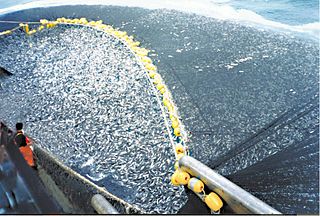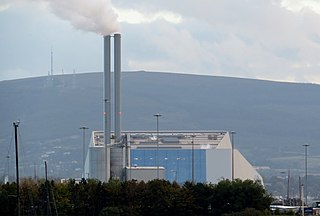Related Research Articles

A non-renewable resource is a resource of economic value that cannot be readily replaced by natural means at a quick enough pace to keep up with consumption. An example is carbon-based fossil fuel. The original organic matter, with the aid of heat and pressure, becomes a fuel such as oil or gas. Earth minerals and metal ores, fossil fuels and groundwater in certain aquifers are all considered non-renewable resources, though individual elements are always conserved.

A renewable resource is a natural resource which will replenish to replace the portion depleted by usage and consumption, either through natural reproduction or other recurring processes in a finite amount of time in a human time scale. Renewable resources are a part of Earth's natural environment and the largest components of its ecosphere. A positive life cycle assessment is a key indicator of a resource's sustainability.

Waste management are the activities and actions required to manage waste from its inception to its final disposal. This includes the collection, transport, treatment and disposal of waste, together with monitoring and regulation of the waste management process.
Refuse-derived fuel (RDF) is a fuel produced from various types of waste such as municipal solid waste (MSW), industrial waste or commercial waste.
The Peel Group is an infrastructure, transport and real estate investment group. It owns holdings in land and property, transport, logistics, retail, energy and media. Peel's direct and indirect investments extend to 40m of investment property and over 13,000 hectares of land.[3] Peel is one of the largest property investment companies in the United Kingdom, and has its UK head office at the Trafford Centre, in Greater Manchester.

Waste-to-energy (WtE) or energy-from-waste (EfW) is the process of generating energy in the form of electricity and/or heat from the primary treatment of waste, or the processing of waste into a fuel source. WtE is a form of energy recovery. Most WtE processes generate electricity and/or heat directly through combustion, or produce a combustible fuel commodity, such as methane, methanol, ethanol or synthetic fuels.
Sustainable cities, urban sustainability, or eco-city is a city designed with consideration for social, economic, environmental impact, and resilient habitat for existing populations, without compromising the ability of future generations to experience the same. These cities are inhabited by people whom are dedicated towards minimization of required inputs of energy, water, food, waste, output of heat, air pollution - CO
2, methane, and water pollution. Richard Register first coined the term "ecocity" in his 1987 book Ecocity Berkeley: Building Cities for a Healthy Future, where he offers innovative city planning solutions that would work anywhere. Other leading figures who envisioned the sustainable city are architect Paul F Downton, who later founded the company Ecopolis Pty Ltd, as well as authors Timothy Beatley and Steffen Lehmann, who have written extensively on the subject. The field of industrial ecology is sometimes used in planning these cities.

Renewable energy commercialization involves the deployment of three generations of renewable energy technologies dating back more than 100 years. First-generation technologies, which are already mature and economically competitive, include biomass, hydroelectricity, geothermal power and heat. Second-generation technologies are market-ready and are being deployed at the present time; they include solar heating, photovoltaics, wind power, solar thermal power stations, and modern forms of bioenergy. Third-generation technologies require continued R&D efforts in order to make large contributions on a global scale and include advanced biomass gasification, hot-dry-rock geothermal power, and ocean energy. As of 2012, renewable energy accounts for about half of new nameplate electrical capacity installed and costs are continuing to fall.

Covanta is a large global corporation that provides a variety of waste management and incineration services. Annually, Covanta's Energy-from-Waste (EFW) facilities, also known as waste-to-energy plants, burn approximately 20 million tons of waste from municipalities and businesses, while also generating sufficient electricity to power one million homes. Covanta recycles approximately 500,000 tons of metal each year. Through a large network of treatment and recycling facilities, the firm also provides industrial material management services to companies in various industries.

Waste are unwanted or unusable materials. Waste is any substance which is discarded after primary use, or is worthless, defective and of no use. A by-product by contrast is a joint product of relatively minor economic value. A waste product may become a by-product, joint product or resource through an invention that raises a waste product's value above zero.

As of 2019, renewable energy technologies provide about 17.3% of Canada’s total primary energy supply and about 67% of its electricity production.
SUEZ Recycling and Recovery UK Ltd, formerly SITA UK Limited, is a British waste management company, established in 1988. It was previously called Sitaclean Technology. It began as a provider of local authority services, with its first municipal services contract in Erewash, Derbyshire in 1989. Suez has expanded its business through a combination of new contracts, joint venture partnerships and acquisitions.
Environmentally Sustainable design is the philosophy of designing physical objects, the built environment, and services to comply with the principles of ecological sustainability.
Atlantic Gateway, sometimes referred to as Ocean Gateway, is a proposed redevelopment strategy for the North West of England, centring on the corridor between Greater Manchester and Merseyside. The development will be backed by £50 billion of investment over 50 years, making it one of the most expensive and expansive development projects in UK history.
The Southeastern Massachusetts Resource Recovery Facility is a waste-to-energy and recycling facility located in Rochester, Massachusetts. It is currently owned by Covanta Energy.
Eco-industrial development (EID) is a framework for industry to develop while reducing its impact on the environment. It uses a closed loop production cycle to tackle a broad set of environmental challenges such as soil and water pollution, desertification, species preservation, energy management, by-product synergy, resource efficiency, air quality, etc.
Atlantic County Utilities Authority (ACUA) is a public agency in Atlantic County, New Jersey, that is responsible for enhancing quality of life through the protection of waters and lands from pollution by providing responsible waste management services.
The Essex County Resource Recovery Facility, also known as Covanta Essex, is a waste-to-energy incineration power station in Essex County, New Jersey, United States. Opened in 1990, it is owned by the Port Authority of New York and New Jersey (PANYNJ) and operated by Covanta Energy. It is located adjacent to the New Jersey Turnpike between Raymond Boulevard and the Passaic River in Newark.
There is enormous potential for renewable energy in Kazakhstan, particularly from wind and small hydropower plants. The Republic of Kazakhstan has the potential to generate 10 times as much power as it currently needs from wind energy alone. But renewable energy accounts for just 0.6 percent of all power installations. Of that, 95 percent comes from small hydropower projects. The main barriers to investment in renewable energy are relatively high financing costs and an absence of uniform feed-in tariffs for electricity from renewable sources. The amount and duration of renewable energy feed-in tariffs are separately evaluated for each project, based on feasibility studies and project-specific generation costs. Power from wind, solar, biomass and water up to 35 MW, plus geothermal sources, are eligible for the tariff and transmission companies are required to purchase the energy of renewable energy producers. An amendment that introduces and clarifies technology-specific tariffs is now being prepared. It is expected to be adopted by Parliament by the end of 2014. In addition, the World Bank's Ease of Doing Business indicator shows the country to be relatively investor-friendly, ranking it in 10th position for investor protection.

The Dublin Waste-to-Energy Facility, also known as the Poolbeg Incinerator, is a waste-to-energy plant serving the Greater Dublin Area, located on the Poolbeg peninsula. The plant is capable of producing up to 60 megawatts of electricity, enough to power 80,000 homes, and provide district heating for up to 50,000 homes in the Dublin area. The facility will process up to 600,000 tonnes of waste per year. Poolbeg accepted its first delivery of waste on the 24th of April 2017.
References
- ↑ "Ince Park Cheshire". Peel Holdings. Archived from the original on 15 May 2013. Retrieved 22 March 2013.
- ↑ "About Ince Park". Ince Park. Retrieved 22 March 2013.
- ↑ "Concept". Ince Park. Retrieved 22 March 2013.
- ↑ "Careers". Ince Park. Retrieved 22 March 2013.
- ↑ "Ince Park". Covanta Energy. Retrieved 22 March 2013.
| This business-related article is a stub. You can help Wikipedia by expanding it. |